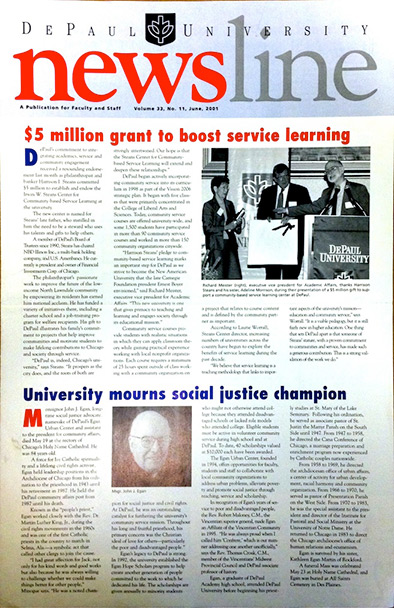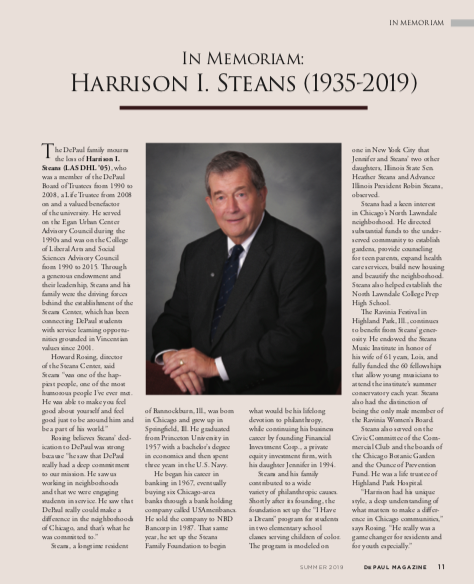Since 1898, service to those who are least served by society has been the primary ethos at DePaul University. Serving others is at the core of what it means to attain a DePaul education and permeates the minds and actions of students, faculty and staff. Through the vision of Harrison I. Steans and the Steans Family, the Steans Center was developed to further support direct integration of service throughout DePaul's curriculum.
Late 1990s
Following years of university strategic planning, the Steans Center began as the Office for Community-based Service Learning in 1998. Under the guidance of the founding director, Dr. Laurie Worrall, and with a grant from the Steans Family, the Office set forth on a mission to integrate service-learning pedagogy into the curriculum. Dr. Worrall and her small staff built the Office's initial relationships between DePaul faculty and Chicago-based community partners in support of service-learning course development, These courses primarily supported the university's newly developed Experiential Learning Requirement (EL), a requirement within the Common Core of DePaul's Liberal Studies Program for all undergraduates. EL was fulfilled by students in one of four ways and students that enrolled in EL courses integrating service-learning pedagogy were placed with community partners to conduct 25 hours of service during the term. Faculty in courses in the College of Liberal Arts and Sciences, the Jarvis College of Computing and Digital Media and the School of Continuing and Professional Studies, formerly School for New Learning, a unit geared specifically toward nontraditional-age college students and strongly emphasizing experiential learning, were early adopters of the pedagogy.
2000s
 DePaul Newsline, May 2001
DePaul Newsline, May 2001After three years of successful growth, upon receiving a generous endowment from the Steans Family, in 2001 the Office was renamed the Irwin W. Steans Center for Community-based Service Learning and Community Service Studies. The endowment resulted in the university allocating considerable financial resources towards the goal of promoting and supporting service-learning within the curriculum. Dr. Howard Rosing and Dr. Troy Harden joined the Center in 2001, joining Worrall and others such as Edgar Ramirez, Anne Rapp, Landi Smith and Avery Buffa in expanding service-learning across all ten colleges and schools at DePaul. Throughout the first years of the 2000s, the Steans Center expanded rapidly moving beyond direct service to project-based, community-based research, and advocacy-based forms of the service-learning pedagogy. The hard work of the center directly contributed to DePaul receiving the Carnegie Foundation's Community Engagement Classification in 2006.
During the later years of the decade, as service-learning courses grew in number, DePaul supported increases in staffing and the Center brought on a number of important contributors with both academic and community-based expertise. Marisol Morales, a community partner director and DePaul alum joined the staff in 2005 to eventually become the Associate Director; Barbara Smith, also a DePaul Alum and the former Business Manager in DePaul's Office of Compliance, became the Center's Business Manager. Courses with service-learning grew to over 170 per year, at one point reaching over 200, and the center shifted its focus from growth in course numbers toward ensuring quality and diversity of support across departments and disciplines. New support systems and course development processes brought continued expansion of service-learning across DePaul's curriculum and supported higher quality instruction. As the Center's work developed in scope, depth and quality, its accomplishments were recognized by the Jimmy and Rosalynn Carter Partnership Award (with the Puerto Rican Cultural Center) and The Washington Center for Internships and Academic Seminars' Civic Engagement Award.
Throughout its first decade and a half, the Steans Center developed numerous programs and partnerships to further its mission. Community Service Studies, is a collaboration with the College of Liberal Arts and Social Sciences to offer the Community Service Studies Minor. Managed by a faculty director from the College, the six-course minor began in 2001 and coincided with the Steans Center's Community Service Scholarship Program in partnership with the University's Office of Admissions and the Office of Financial Aid. In 2004, a generous endowment from the Robert R. McCormick Foundation resulted in the creation of the McCormick Community Internship Program. The Program provides opportunities for advanced undergraduates to craft their own funded internship in collaboration with a DePaul community partner. Other programmatic additions included: Catholic School Internships to serve underserved Catholic school partners; Community Partnerships Internships to serve the community partners most consistently supporting service-learning courses; Jumpstart to engage students in support of early childhood literacy programs; the Environmental Stewardship Community Internship Program, a partnership with Gary Comer Youth Center and the Department of Environmental Science and Studies; and, most recently, Public School Internships to support Chicago Public Schools that are struggling to meet achievement standards.
2010 - present
In 2009, the Center established the Community-based Research Faculty Fellowship to support faculty in producing scholarship driven by community interests, integrated with curriculum, and in support of their promotion and tenure. During the same year, the Center began to integrate the work of the Egan Urban Center (EUC), known city-wide since 1994 for its deep engagement into communities providing research and technical assistance to community organizations (see Egan Office). EUC developed a Certificate in Community Engagement for public and nonprofit partners and brought service-learning students into struggling Chicago Public Schools to strategically position them as an asset contributing to school improvement. In 2013, EUC was renamed the Egan Office of Urban Education and Community Partnerships (UECP) of the Steans Center. Under the direction of John Zeigler, UECP was charged with overseeing Catholic, Public, and Early Education School Partnerships as well as innovative grand-funded projects that integrate student learning and faculty research and scholarship.
The Egan Urban Center's transition into the Steans Center as the Egan Office (UECP) brought a dynamic community engagement culture built through years of work supporting capacity building in Chicago communities employing Asset-based Community Development (ABCD) as an approach. ABCD had been a central component of the Steans Center's professional development of staff during the previous decade. However, in 2016, the Center welcomed the Asset-based Community Development (ABCD) Institute, a 501c3 nonprofit, into its space on the Lincoln Park Campus. The ABCD Institute, founded by Northwestern University professors John McKnight and John (Jody) Kretzmann, offered DePaul an incredible resource through a global network of ABCD practitioners and numerous trainings, workshops and publications available to faculty, staff, students and community partners of the university.
 Harrison I. Steans, 1935-2019
Harrison I. Steans, 1935-2019
Today, the Steans Center is a dynamic multifaceted community engagement center that supports more than 4000 students a year and hundreds of faculty members and community partners. The generous endowment from the Steans Family, led by the late Harrison I. Steans, allowed DePaul to develop high quality service-learning and community engagement initiatives that serve student learning and personal and professional growth, faculty scholarship, and partner organizations in building assets that serve their communities.